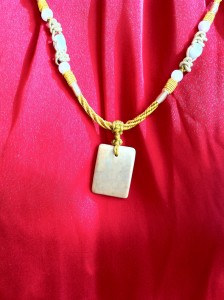ShareAttention:
Communication skills affect
all of us in all walks of life.
“Communications is the response you get.”
The information presented here will be most valuable
in changing your Karma.
Last Wednesday I shared some
real gems on communication skills
and I promised you that I would share
with you the “The Ten Linguistic Viruses.”
It is from an article written by,
Matthew Budd, M.D., and Larry Rothstein, Ed.D.
I always keep my promises.
Before I give you the goods, I have
observed from my students and patients
some gems in regards to communications.
When a student tells me that he his going
to do something and doesn’t do it, it causes
more havoc in their life than one could ever imagine.
Here is an example: I’ve known John for years,
every time I see him he says,
“Dr. Wu I am going to meet you on the
beach in the morning to train will you
call me in the morning?”
So for a few weeks I did call John early
in the morning to remind him but he always
has an excuse on why he can’t go.
Sometimes it’s about the wind being too
strong, other times it’s about no wind at
all and it’s too still for him. What makes
me laugh is the evening calls are all about
being ‘gung ho’ to train and get in shape
but the morning calls are all about excuses.
I don’t know if John really gets what he is
doing to himself; it’s costly in more ways
than one could imagine.
When you say you’re going to do something,
you are giving your word, your promise to perform.
When you don’t do it you are not only breaking
your word and your promise, you are
causing a break in your integrity.
Our body and mind likes to be congruent,
so when you are continually breaking the
commitment and promise of doing what you
say you will do then your body and mind will
naturally still strive to keep you honest.
Listed below, are the
“Ten Linguistic Viruses.”
They attack relationships, alter
the structures
of the individuals in them and cause
dissatisfaction, bad moods and
even ill health. Learning what they are
will allow you to listen to
others more effectively, and heal them
as well as yourself.
1. NOT MAKING REQUESTS.
There may be something that you
want or need from someone else, but
you don’t make a request. Why is this?
You may have a reluctance or
fear about asking others for something:
They could say no and cause
you to feel rejected. In fact, a no to a
request is just that, no to
the action of requesting, not a rejection
of the person.
Another reason people don’t make
requests is that they’re afraid
others will think they’re incompetent.
But making a request is not an
admission of weakness. The president of
the United States or the CEO
of a large corporation makes a staggering
number of requests each day.
In fact, one aspect of power is the capacity
to make powerful requests.
Still another reason people don’t make
requests is that they think a
request is an imposition. They forget that
one way that people achieve
meaning in their lives is in fulfilling the
requests of others.
A request simply invites another person to
participate in your life.
Take this as a way to honor others,
not to burden them.
2. LIVING WITH UN-COMMUNICATED EXPECTATIONS.
A common form of “not requesting”
occurs when an individual lives in
a world of expectations that are really
just unexpressed requests.
Often we have private conversations
with ourselves about what others
should and should not do. But we never
make overt requests of these
people. Subsequently, when they don’t do
what we expect, we’re
disappointed, resentful and angry.
The solution is to translate “shoulds”
into clear requests.
The benefit will be less resentment,
less anger, less guilt and more
satisfying relationships.
3. MAKING UNCLEAR REQUESTS.
A husband may say to his wife,
“I want you to support my career.”
Can you see that the husband may have a
different picture than the wife of
what “support” looks like?
What kind of support? When? All of
this information is missing. Later
on, when a minor problem arises, the
maker of the unclear request is
likely to say, “You promised to support
my career, but you didn’t!”
To coordinate your life successfully
with others, your requests must
be precise and detailed. You’re not
insulting the listener, you’re
setting up the possibility for mutual satisfaction.
It’s not enough
that you understand; the person receiving the
request must share your
understanding.
4. NOT OBSERVING THE MOOD OF YOUR REQUESTS
The mood of your utterance, as
much as your words, affects the
listener. If you’re demanding, people
might decline your requests
because they see you as arrogant and
righteous, or they might make
promises to you out of intimidation, not choice.
My high school algebra teacher
always made requests in the tone and
mood of demands. Students rarely declined
his requests, but acted
resentfully when they tried to do
what he had asked.
A suggestion: Observe the mood
produced in the listener of your
request; adjust your mood to produce
the “listening” you want.
5. PROMISING EVEN WHEN YOU
AREN’T CLEAR WHAT WAS REQUESTED.
Committing yourself when you aren’t
clear about what you’ve committed
to is foolish. Sometimes a person thinks
he knows what’s being asked
of him, so he begins an activity, such as
making a meal. But as he
goes along, his lack of clarity is revealed.
He becomes confused.
What did she really want?
What if I’m doing it wrong?
If you’re not sure what the requester
wants, clarify it with him or
her. You won’t look stupid. Rather,
you’ll be building an identity of
being committed to fulfilling his or her request.
6. NOT DECLINING REQUESTS.
Some of us say yes to every request.
We’ve been trained to please
other people, and this is made manifest
in our compliance. The problem
with this belief is that it’s destructive
for both you and others.
The yes sayers’ are often overloaded
with promises to keep. The result
is a perpetual fear of failure, which
prompted the compliance in the
first place. This vicious cycle generates
anxiety, exhaustion and
burnout.
Things aren’t much better for the people
receiving the yes sayers’
promises. They never know which
promises will be fulfilled and which
ones are in jeopardy. Over time, people
become distrustful of the yes
sayer. They think, “You just never can
be sure about him; he’s not
sincere.”
An inability to say no is not a problem
of articulation or diction,
but of an embodied tendency to have
to say yes, to be “nice” and not
to upset others. Learning to say no
requires practice for those yes
sayers who find it difficult.
7. BREAKING PROMISES WITHOUT
TAKING CARE: UNDERMINING TRUST.
When you make a promise, you’re building
expectations that you will
take action. If the promise is broken, the
person will begin to lose
trust in you and feel betrayed.
We are all human and cannot know the future.
In the process of
fulfilling a promise, things may happen that
keep you from completion.
If you simply ignore your promise, you’re
consciously betraying your
word and not taking care of the other party.
In contrast, if you
contact the requester, describe the present
problems that are keeping
you from fulfilling your promise, apologize
for the broken promise,
offer to make a new promise in a time frame
that you can guarantee and
assist with the cleaning up of any
mess that you produced.
8. TREATING ASSESSMENTS AS FACTS.
There is no truth to statements of judgment.
You can provide evidence
for what you say, but that still doesn’t
make it the truth. If we
treat assessments as truth, conflict arises.
People who hold their assessments as the
truth are generally rigid or
arrogant. They cannot stand diversity and
become angry at
differences. These people are a pain to be
around and are themselves
uneasy.
9.MAKING ASSESSMENTS
WITHOUT RIGOROUS GROUNDING.
Even though your judgments
aren’t the truth, you can make them with
rigorous “grounding” – that is, you
can say what you say based on
evidence.
People who make assessments
without rigor are viewed as flaky and full
of opinions that change like the weather.
They aren’t taken seriously
and they often suffer from insecurity and
low self-esteem. Gossip is
an especially harmful kind of assessment,
which lacks rigor and
purpose. Gossips get a false sense
of power from this activity, but
underneath they remain insecure and uneasy.
Connect your declarations with
possible plans for action for which you
are accountable, preferably to someone else.
10.MAKING FANTASY
AFFIRMATIONS AND DECLARATIONS.
When you make a fantasy affirmation
or declaration, you assume that it
will happen by itself. An example
would be declaring that you would
like to start a restaurant, even though
you don’t know anything about
cooking or how to run a business.
By contrast, a realistic affirmation or
declaration pictures a reality
that does not yet exist, but is attainable
through a series of
reasonable steps.
The 10 Linguistic Viruses not only create
ineffectiveness and friction
between people, but also produce negative
mood states, which, in turn,
threaten your well-being and health.
For instance, people who never
make requests usually don’t get what they
want in life and are often
disappointed and stuck. Such people may
have secret expectations of
others, which they never express. This also
leads to disappointment
and anger and resentment.
Inertia and anger are both negative mood
states that produce bodily changes in the
muscles, circulation, heart
and brain. People who can’t decline requests
also place their health
in jeopardy. They are often overburdened
and become exhausted, burned
out and depressed.
If language is the foundation upon which
human life is built, on which
we construct our human interactions and
even our notion of self, then
competence in language will bring you more
satisfaction, joy and
effectiveness in living.
My work with thousands of patients bears
this out. When people become aware
of their behavior in the
linguistic domain, they achieve greater
effectiveness, greater
satisfaction and a better mood.
I wish you the best in your Health,
Wealth and Happiness
Dr. Wu Dhi
PS
Training your body, mind and spirit
will keep you mentally, physically
and spiritually awake.
This is what I teach to the members of the
Qi Gong Inner Circle.
Join today!
www.qigonginnercircle.com















